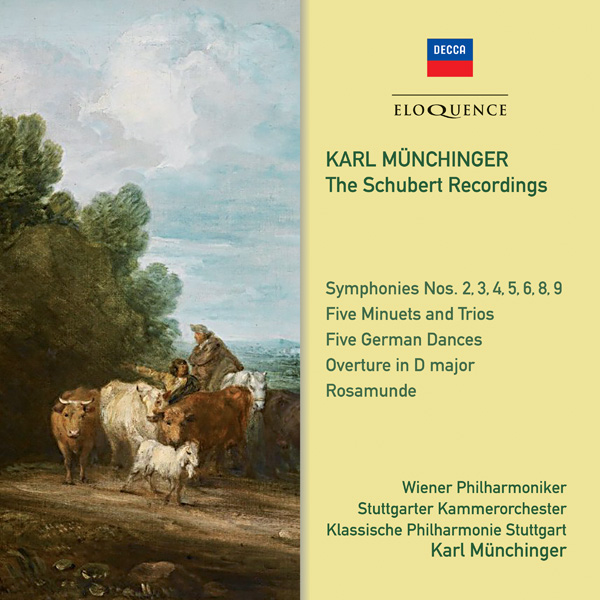Born and bred in the city, Karl Münchinger founded the Stuttgart Chamber Orchestra in the summer of 1945 and it was with this ensemble that he made recordings of Bach and other Baroque and early Classical repertoire (for Decca) that would be staples of the catalogue for decades to come. He was among the first modern performers to popularise Pachelbel’s Canon and Gigue, on a Baroque compilation that became an introduction to the world of classical music for many thousands of listeners.
His work, however, was not solely confined to his home city. His refined ear and old-school musicianship were welcome around Europe, including Vienna where he recorded six of Schubert’s symphonies between 1959 and 1965, excluding the First and the Ninth: the latter omission remedied by Decca in 1969 when the ‘Great’ C major was set down with the Klassische Philharmonie of Stuttgart which Münchinger had grown as an offshoot of the chamber orchestra.
The Vienna recordings were warmly welcomed at the time, for values of charm, grace and discipline which may be thought eternal in this music whatever the passing fashions of orchestral sonority. Reviewing the Fourth and Fifth in September 1970, High Fidelity reported the ‘impeccable playing’ of the Vienna Philharmonic, ‘and the recording itself is faultless’. In general the critical reaction mirrored that of Gramophone’s reviewer in May 1968: ‘Münchinger’s Schubert performances are lively (yet never too fast) and affectionate. Both playing and recording are very good.’
These performances, never before issued together, are newly remastered and come with a prologue, in the form of German Dances, recorded in Stuttgart in 1955. There is also an epilogue to round out the conductor’s Schubert legacy: the complete incidental music to ‘Rosamunde’, set down in Vienna in 1970: a gramophone classic that has hardly left the catalogue since and was reissued by Decca fifteen years ago in its ‘Legends’ series.
FRANZ SCHUBERT
CD 1*
Symphony No. 2 in B flat major, D.125
Symphony No. 3 in D major, D.200
Symphony No. 4 in C minor, D.417 ‘Tragic’
CD 2*
Symphony No. 5 in B flat major, D.485
Symphony No. 6 in C major, D.589 ‘The Little’
Five Minuets and Trios, D.89
Five German Dances, D.90
CD 3*
Symphony No. 8 in B minor, D.759 ‘Unfinished’
Symphony No. 9 in C major, D.944 ‘Great’
CD 4
Overture in D major, D.556
Rosamunde, D.797
Wiener Philharmoniker (Nos. 2, 3, 4, 5, 6, 8, Overture D.556, Rosamunde)
Stuttgarter Kammerorchester (Minuets and Trios, German Dances)
Klassische Philharmonie Stuttgart (No. 9)
Karl Münchinger
*FIRST INTERNATIONAL RELEASE ON DECCA CD
Recording Producers: Ray Minshull, Erik Smith (Nos. 2 & 8); Erik Smith (Nos. 4 & 5); Ray Minshull (Nos. 3 & 6, Overture D.556); John Mordler (No. 9); Victor Olof, James Walker (Minuets and Trios, German Dances); James Mallinson (Rosamunde)
Balance Engineers: Gordon Parry, James Brown (Nos. 2 & 8); Gordon Parry (Nos. 3, 4, 5, 6); Martin Fouqué (No. 9); Gil Went, Roy Wallace (Minuets and Trios, German Dances); Michael Mailes (Overture D.556); Colin Moorfoot, Philip Wade (Rosamunde)
Recording Locations: Sofiensaal, Vienna, Austria, 13–17 March 1959; (Nos. 2 & 8), 21–22 October 1963 (No. 5), 23–24 October 1963 (No. 4), 22–25 February 1965 (Nos. 3 & 6), 5–8 April 1967 (Overture D.556), 19–21 November 1974 (Rosamunde); Schloss Ludwigsburg, Ludwigsburg, Germany, 12–14 May 1969 (No. 9); Victoria Hall, Geneva, 27–31 October 1955 (Minuets and Trios, German Dances)
Remastering Engineers: Paschal Byrne; Chris Bernauer
‘Münchinger conducts the ‘Unfinished’ admirably, a performance notable for its wide dynamic range (which the excellent recording helps, of course). The very start, for instance, really is pp for once, while the climaxes ring out splendidly … The finale [of No. 2] is a Presto vivace and is most successfully played as such, with its second subject given delightful charm.’ Gramophone, February 1966
‘The well-known B flat entr’acte is charmingly delicate and affectionate and is beautifully played – and how marvellous the very soft tone of the Vienna strings is. The choruses of Shepherds and Huntsmen show, as well as excellent chorus singing, very good solo singers from the choir.’ Gramophone, March 1976 (Rosamunde)

